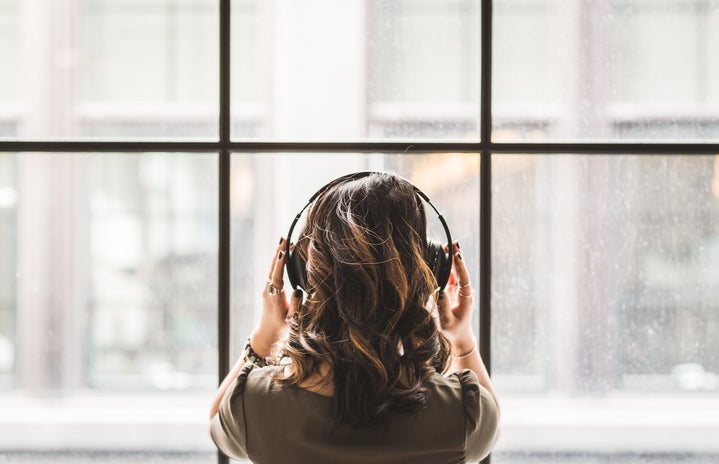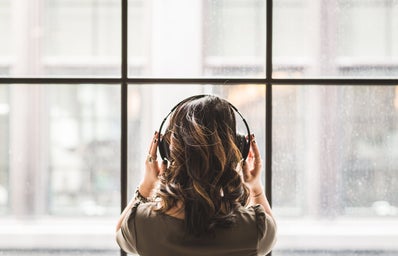I’ve written songs since I was in grade four. Well, it was more like glorified poetry at that point because I had no ability to accompany myself (I mean, I tried). I remember slapping the carpeted floor in my bedroom (“drums”) while recording myself singing numerous songs I’d later put on CDs for family members. I had (and still have) notebooks filled with poetry that I would conceive beats and melodies for, unaware of any chord progressions that would later develop.
At age 8, I began piano lessons, which until high school I really did not enjoy. I couldn’t play the piano and sing simultaneously until high school either, and when I began, it was really awkward and hard. There were long dramatic pauses that I tried to fill with vocal riffs, but really I was just scrambling for the next chord. Like anything, with practice, I became more comfortable singing and playing the piano, and started venturing outside of “normal” minor or major chords. I’d incorporate arpeggios (broken down chords, essentially) as well as, one of my favorites sounds: 7s. Basically, an octave has 8 notes, so when you play a “C7” for example, you’re playing the octave (C to another C), but you move down a note at the top to make it one down from a full 8-note octave—I hope that makes sense.
Some time in 2014, I started posting videos to a YouTube channel that I’m still active on today (youtube.com/brittburliss, if you’re interested). At first, it was acapella covers (me singing other people’s songs) and originals (me singing songs I’d written). Within the next year, I started posting piano covers and piano originals. I learned how to match either my vocals to the sounds I loved on the piano or the piano music to melodies I’d already written. It was rewarding to hear previously acapella songs come together with harmony.
I took singing lessons, too, my freshman year of high school. I ended up quitting because my instructor wanted me to sound a certain way that wasn’t authentic to “my sound.” The more you explore your musicianship, the more obvious your individual style and sound will become. It took me years, and I still can’t define it; I just know it when I make it.
Around my sophomore year in high school, one of my best friends taught me how to play the acoustic guitar, and that completely rocked my world. (Literally—I went on to buy an electric guitar). The guitar was so different from the piano in its vibe: it was softer and more relaxed and I could play in the middle of the night without waking up my family. I remember the night she taught me how to play, I stayed up until 3 am trying to get the transitions between chords to flow. It’s so awkward to play the guitar at first; you have to push down on the strings a lot harder than you think you do, and honestly, it really hurts. I played until my fingers were raw, indented by the strings the next day.
Now that you have a background in my musical history, I want to offer insight into how I write songs. I’ve never thought of it as something I could describe in a “how-to” kind of way because it is so essential to my self-expression. For example, I’ve often been in conversations where I don’t know how to communicate my thoughts. I don’t like confronting people, and often it’s extremely hard to be vulnerable, but these are two things I could easily do in songwriting. Whether it was a situation (positive, negative, or neutral) with a friend, family member, love interest, or myself, songwriting allows me to say what I mean and truly mean what I say.
When I feel inspired to write a song, usually I either have a tune or lyrics stuck in my head and I think “I have to do something with this.” I either whip out my “Voice Memos” app and hum or sing or speak words so I don’t forget them, or I scurry to an instrument and dig in. The thing about these creative surges is that they can pass so quickly, so when I feel it, I try to capitalize on them.
Whether I’m starting with instrumentals or lyrics, I usually let the lyrics flow from my mind organically. Sometimes I want my lyrics to rhyme. Other times, the mood that I’m in deems that trite. I try not to censor myself when I write music because ultimately, I’m doing it because I want to do it. I’m doing it for myself. No one has ever told me to write songs, or even suggested I do it. I just started and continue because I love it. It makes me feel reinvigorated with life and all that I get to partake in this world.
More often than not, I’ll begin with a chord progression and see what comes to mind. Whatever has been consciously or subconsciously bothering me will undoubtedly spill out. It’s just waiting to be articulated.
The biggest piece of advice I can offer anyone who wants to write a song is to have self-compassion. Let yourself say what you want to say without questioning why you are saying it. Clearly, there’s a reason, but don’t overthink it. Enjoy it! Screw censoring yourself, isn’t the whole point of self-expression to be honest and to express yourself? Relax and allow yourself to follow wherever your mind wants to take you. Pretend it’s a form of lyrical yoga: don’t be afraid to stretch yourself. There are no wrong answers.
Music is a beautiful gift to the world that I believe truly anyone can create. You don’t need to be “the best” at anything to do it, so throw out that whole weird competitive streak when it comes to music. What you create is valid and beautiful.
Britt xx


